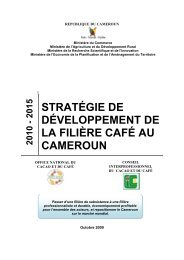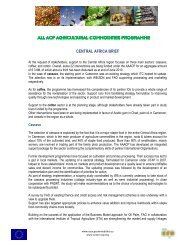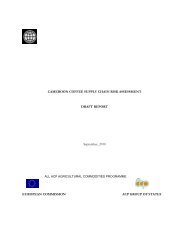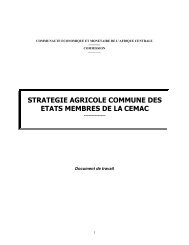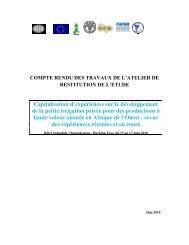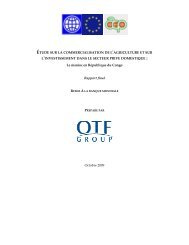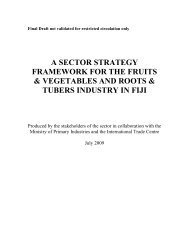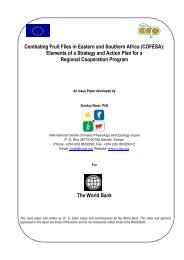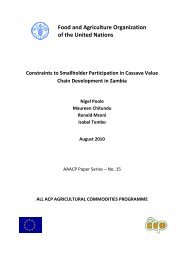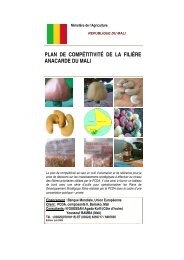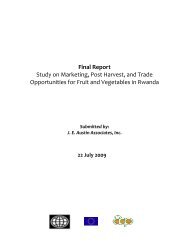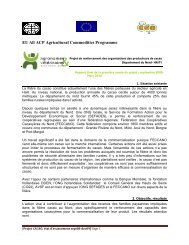Organization and Performance of Cotton Sectors in Africa ... - infoDev
Organization and Performance of Cotton Sectors in Africa ... - infoDev
Organization and Performance of Cotton Sectors in Africa ... - infoDev
You also want an ePaper? Increase the reach of your titles
YUMPU automatically turns print PDFs into web optimized ePapers that Google loves.
a few years, it <strong>in</strong>dicates that some <strong>of</strong> the obstacles mentioned above could beovercome <strong>and</strong> that new ways <strong>of</strong> do<strong>in</strong>g bus<strong>in</strong>ess could emerge.PERFORMANCE OF OIL SECTORS, SEED PRICING,AND RETURNS TO FARMERSFor this study, a key performance <strong>in</strong>dicator for the oil sector is the price thatg<strong>in</strong>ners pay (or receive) for cotton seed. Given the competition from importedpalm oil <strong>in</strong> all the study countries, the ma<strong>in</strong> determ<strong>in</strong>ants <strong>of</strong> the cotton seedprice are expected to be the follow<strong>in</strong>g:■■■■■■Whether the country is l<strong>and</strong>locked (a major determ<strong>in</strong>ant <strong>of</strong> the overl<strong>and</strong>transport cost <strong>in</strong>curred by imported palm oil). Note that this partially compensatesg<strong>in</strong>n<strong>in</strong>g companies <strong>in</strong> l<strong>and</strong>locked countries for the high free-on-truckm<strong>in</strong>us free-on-board costs they <strong>in</strong>cur when export<strong>in</strong>g their l<strong>in</strong>t.The level <strong>of</strong> tariff protection (if any) <strong>of</strong>fered to domestically produced edibleoils. In Ben<strong>in</strong>, Burk<strong>in</strong>a Faso, <strong>and</strong> Mali, a common external tariff <strong>of</strong> 5percent applies to edible oil imports. However, some smuggled oil importsavoid this tariff <strong>and</strong> also avoid the 20 percent value added tax that is appliedto domestically produced oils. Thus, domestically produced oils are at a netdisadvantage when compared with these smuggled oils.Whether oil processors are able to br<strong>and</strong> cottonseed oil so as to raise itsprice above that <strong>of</strong> imported palm oil.The quality <strong>of</strong> oil produced <strong>in</strong>s<strong>of</strong>ar as this quality reflects the degree <strong>of</strong> process<strong>in</strong>g.Discussions <strong>in</strong> Tanzania suggest that it could cost twice as much toproduce high-quality oil (deodorized, neutralized, cleaned, <strong>and</strong> gossypolremoved) as to produce a semi-ref<strong>in</strong>ed oil.The strength <strong>of</strong> dem<strong>and</strong> for cottonseed cake from the domestic livestock<strong>in</strong>dustry.The efficiency <strong>of</strong> the oil process<strong>in</strong>g sector.A recent survey by the International <strong>Cotton</strong> Advisory Committee (ICAC) providesuseful <strong>in</strong>formation with which to benchmark the valorization <strong>of</strong> cottonseeds with world market st<strong>and</strong>ards. Accord<strong>in</strong>g to the ICAC survey, globally a kilogram<strong>of</strong> seeds fetches on average 18 U.S. cents/kg, which represents a good <strong>in</strong>comefor the grower. The data by region show that cotton seed has a higher value <strong>in</strong>non-WCA <strong>Africa</strong>n countries <strong>and</strong> <strong>in</strong> Asia, where a kilogram is sold at 22 U.S.¢/kg<strong>and</strong> 20 U.S.¢/kg, respectively. A kilogram <strong>of</strong> cotton seed after g<strong>in</strong>n<strong>in</strong>g is sold at13 U.S.¢/kg <strong>in</strong> North America (average <strong>of</strong> Mexico <strong>and</strong> the United States) <strong>and</strong>10 U.S.¢/kg <strong>in</strong> South America. <strong>Cotton</strong> seed prices are the lowest <strong>in</strong> West <strong>Africa</strong>ncountries, where a kilogram <strong>of</strong> seed is sold at 7 U.S.¢/kg (Chaudhry 2007).Table 8.1 shows the cotton seed prices paid by oil processors <strong>in</strong> the n<strong>in</strong>estudy countries <strong>in</strong> 2006. The table shows that the price paid <strong>in</strong> Zimbabwe wasmore than twice the price paid <strong>in</strong> Burk<strong>in</strong>a Faso (the lowest recorded with<strong>in</strong> theVALORIZATION OF SEED COTTON BY-PRODUCTS 101



